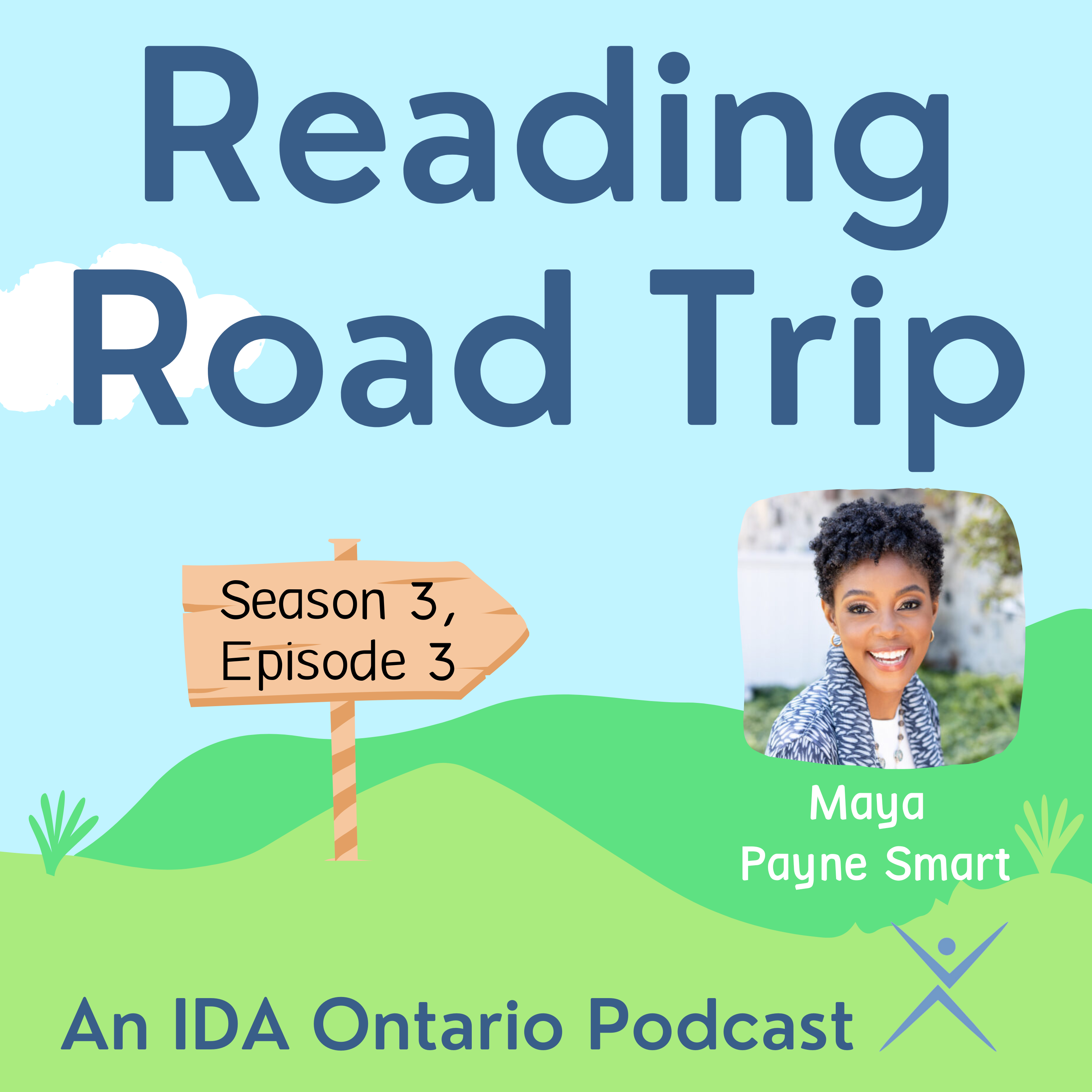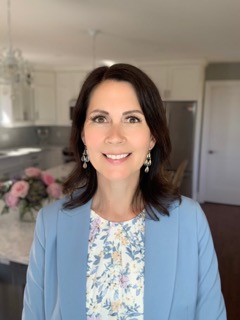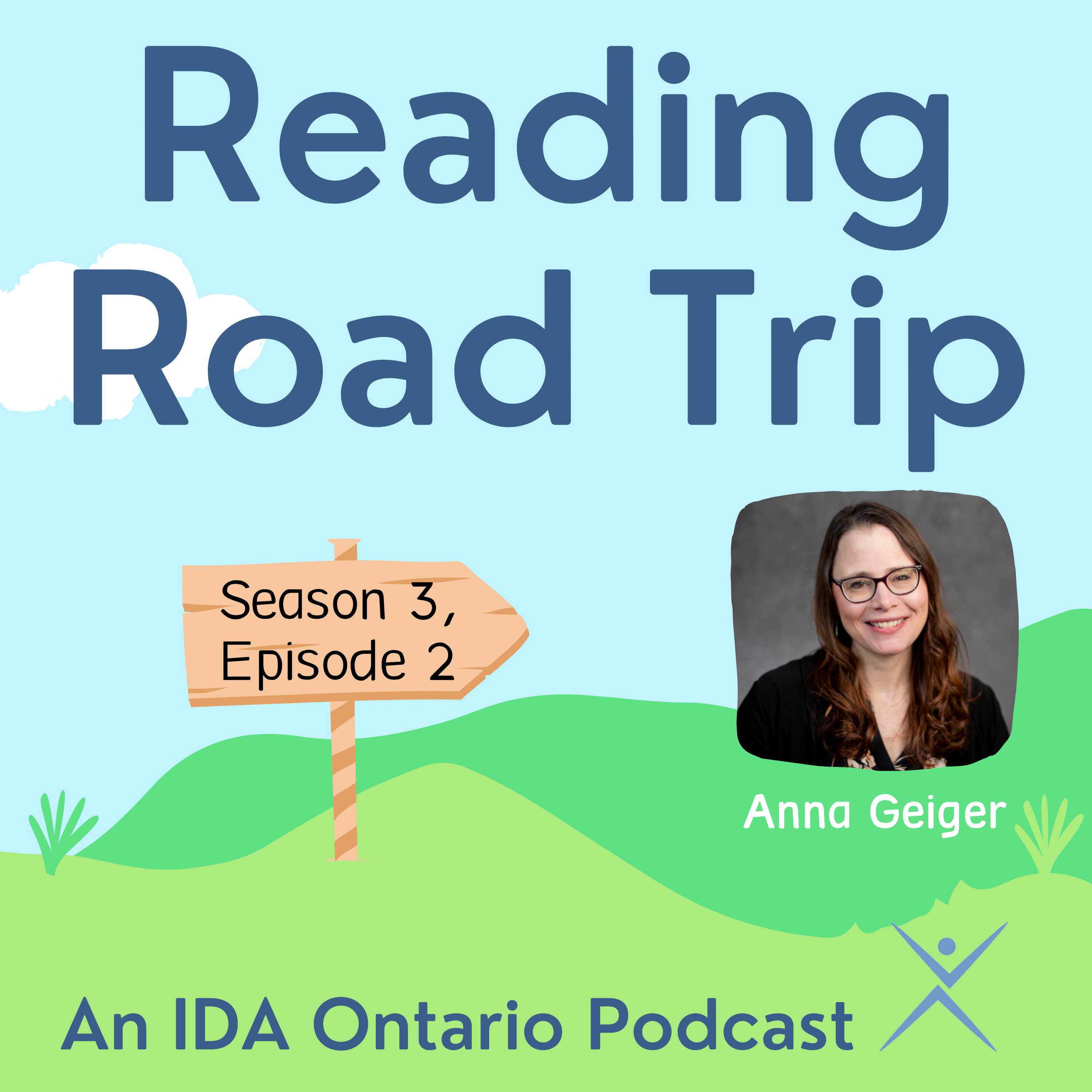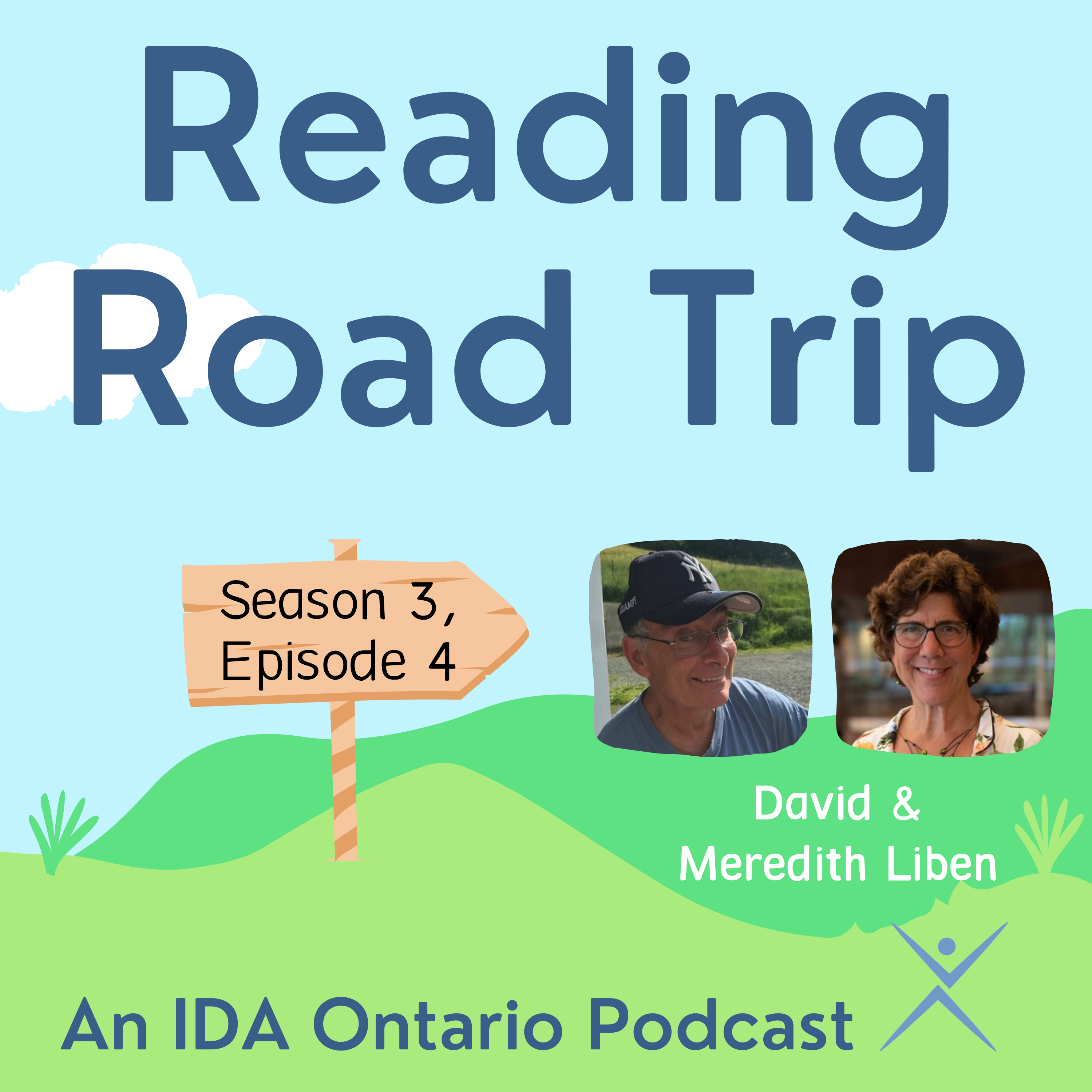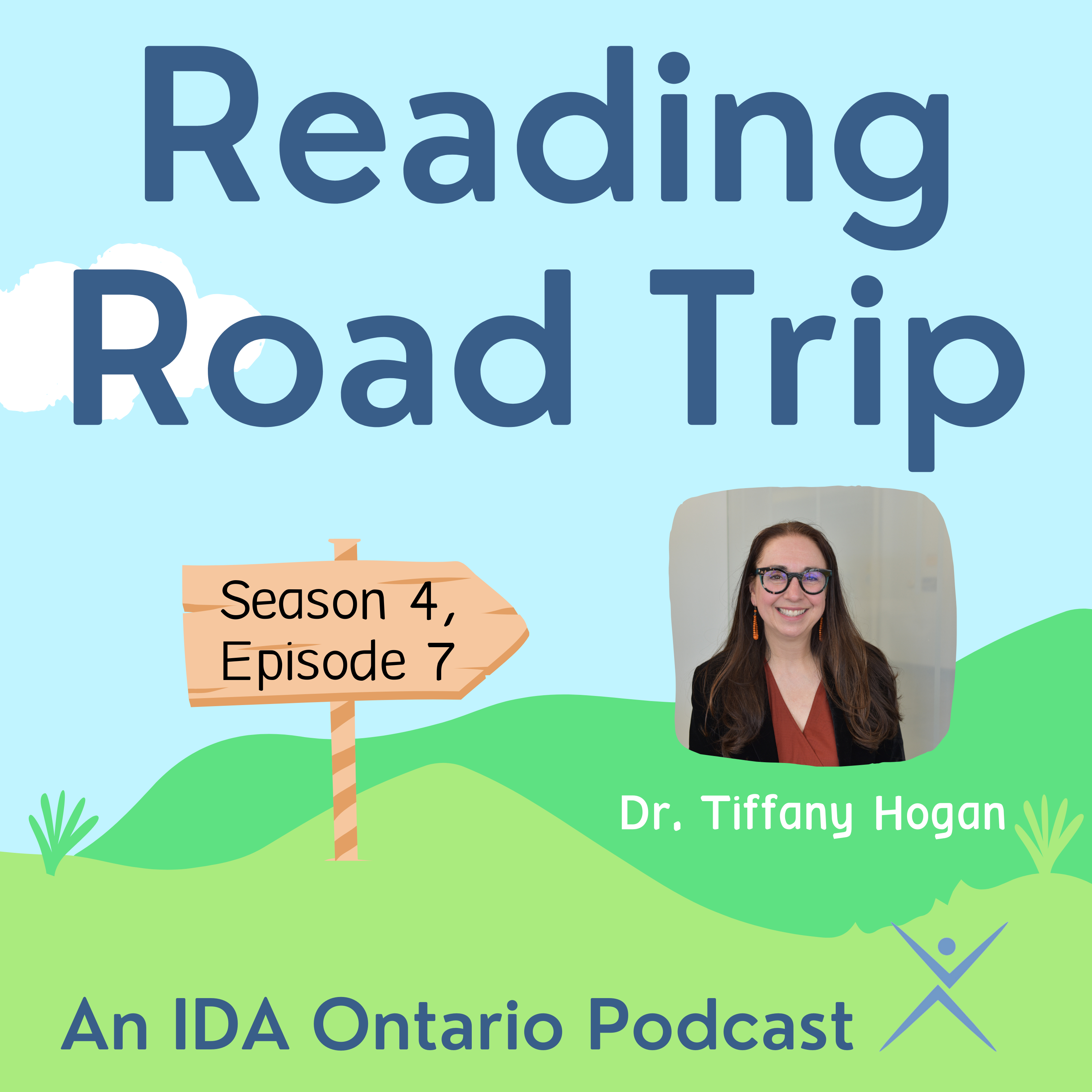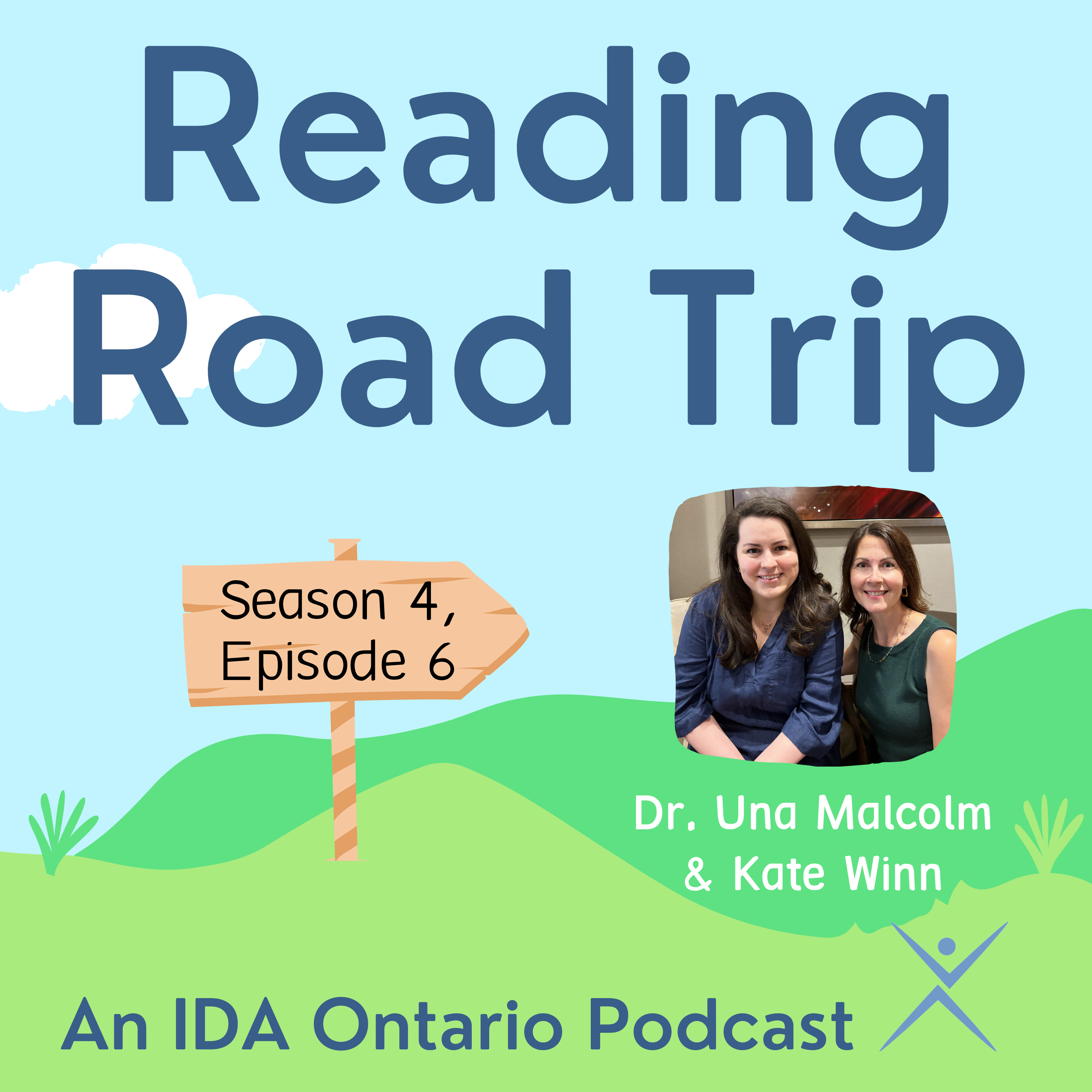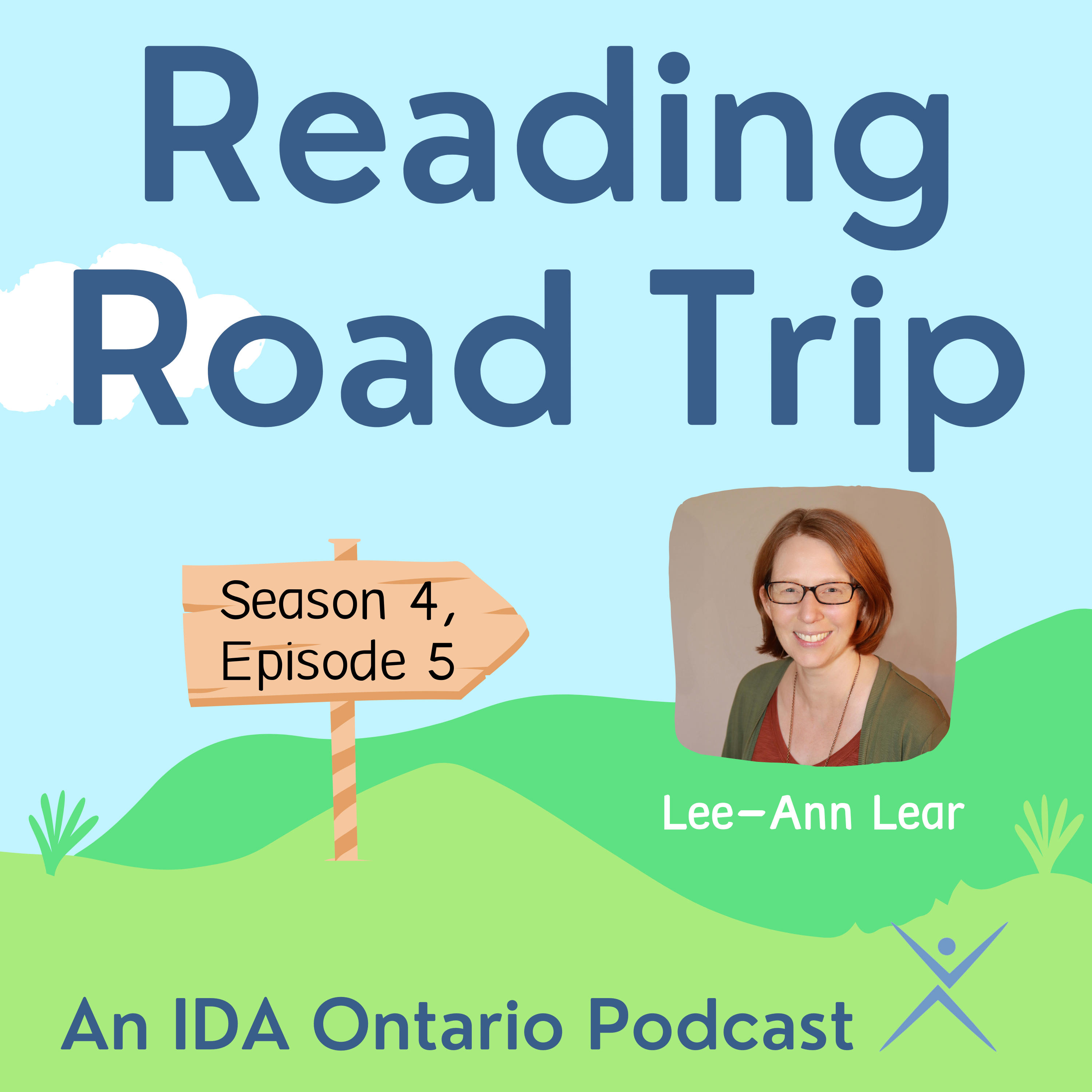Episode Transcript
[00:00:01] Sold A Story Promo: All over the country. We need to improve reading. In Wisconsin, schools are changing the way they teach reading. I'm calling for a renewed focus on literacy. We have gotten this wrong in New York and all across the nation, and it's happening because of a podcast. I think your podcast has changed my life, and I'm going to share this podcast with everyone I meet. Sold a Story investigates how teaching kids to read went wrong. New episodes of Sold A Story are available now.
[00:00:35] Kate Winn: Hello to all you travellers out there on the road to evidence-based literacy instruction. I'm Kate Winn, classroom teacher and host of IDA Ontario's podcast reading Road Trip. Welcome to the third episode of season three.
Before we get started, we would like to acknowledge that we are recording this podcast from the traditional land of the Mississauga Anishinaabe. We are grateful to live here and thank the generations of First Nations people for their care for and teachings about the earth. We also recognize the contributions of Métis, Inuit, and other Indigenous peoples in shaping our community and country. Along with this acknowledgement and in the spirit of truth and reconciliation, we'd like to amplify the work of an Indigenous artist. And this week we are sharing the picture book the Girl and the Wolf, written by Katherena Vermette, illustrated by Julie Flett. And this came recommended to us on Twitter x by Sarah Carr. While picking berries with her mother, a little girl wanders too far into the woods. When she realizes she is lost, she begins to panic. A large gray wolf makes a sudden appearance between some distant trees. Using his sense of smell, he determines where she came from and decides to help her. Through a series of questions from the wolf, the little girl realizes she had the knowledge and skill to navigate herself. She just needed to remember that those abilities were there all along. And I can tell you my kindergarten students very much enjoyed this book and a whole discussion about, you know when the wolf is always the Big Bad Wolf and what the Wolf's role was in this book. And was the wolf there or not? It was a really fun discussion. Add this title to your home or classroom library today and also note that Katherena Vermette writes novels for adults too. I have read and can recommend The Break and The Strangers if you are looking for grown up reading material as well.
In each episode. This season, we're also going to share a review for reading Roadtrip from the Apple podcasts app. This week we want to thank Tutor K 2 for so kindly posting the following I have been tutoring in the new science of reading protocol and these podcasts have been invaluable. I have purchased many of the books recommended by the experts interviewed. Every teacher in Ontario should be listening to these podcasts. The future looks bright in Ontario for K two students learning to read. Thank you so much Tutor K 2 and everyone who leaves us a rating and or review in whatever podcast app you use. Not all of them have the ability to leave reviews. Some are just ratings, but every single one that you give is so appreciated. And now on with the show.
[00:03:09] Kate Winn: I am so excited to introduce this week's guest on reading road trip. Maya Payne Smart is a parent educator, literacy advocate, and the author of Reading For Our Lives: A Literacy Action Plan From Birth to Six. Her website, mayasmart.com, publishes new book lists, literacy activities and other free family resources weekly to help parents play their dual roles as first teachers and educational advocates. She holds a master's degree in journalism from the medill school at Northwestern University and a bachelor's in social studies with honors from Harvard University. She serves as affiliated faculty in educational policy and leadership in the College of Education at Marquette University. Welcome to the show, Maya.
[00:03:53] Maya Payne Smart: Thank you so much for having me. So excited to be here today.
[00:03:57] Kate Winn: I have to tell you how much I loved your book. When it came out, I was already quite deep into learning about the science of reading from a teacher's perspective, and I had heard that this new book was coming out and a lot of parent books were out there. But of course, as we'll get into the advice, as earnest as it was, well meaning as it was, wasn't necessarily the most effective advice. But when I saw yours and read a little bit about it, I thought, oh, I think this is actually going to be something that aligns with the research. When I read it, I thought, yes. And so I've been really, really excited to try to get you on the show. In Reading For Our Lives, you write, quote in short, I made every mistake in the book. If there had been such a book, oh, how I wished there were a book. Please fill us in about exactly what motivated you to write this book.
[00:04:42] Maya Payne Smart: I came to this work as a parent. I had my daughter about 13 years ago, and I named her after an author, Zora Neale Hurston. I'm named after an author, Maya Angelou. And so just reading and books and a love of literature had just been a big part of my life, and I wanted to pass that on to her. And the bulk of the advice that you get as a parent is just to read to your little one. But as I was reading board books and picture books to her. I was also reading news stories that talked about real problems with reading achievement in the US, particularly between black children and white children or children from lower socioeconomic backgrounds and higher socioeconomic backgrounds. So I felt like there was just this extraordinary gap in information for parents. There had to be more to it than just reading to your child. And then when you speak with friends who have multiple children, you often hear these stories of, I did the exact same thing with all of my kids, and yet this one struggles. So I just got curious as a parent.
[00:05:42] Kate Winn: Excellent. In the introduction, you write, quote, these are capable students whose reading development is hobbled by a devastating mix of untapped opportunity at home and inadequate instruction in schools. So we'll talk a little bit about both today, the home piece and the school piece, but just sort of high-level overview first. What do you mean by untapped opportunity at home?
[00:06:04] Maya Payne Smart: I think that, and there's a lot of research to support this idea that there is so much brain growth and development and sort of foundational language ability that's established in the first years of life, and those are years before kids are in formal education, and parents aren't given any formal education on what to do to forge those brain connections and the brain function that kids need to thrive as readers years later. So the untapped opportunity at home, a lot of it is just building rich vocabularies and dynamic relationships with kids through back-and-forth conversation. That really is how the brain grows and develops. But parents don't know that. So we don't talk as much as they could. So as much as we could. So that's sort of the first piece. Just that this idea that language precedes literacy, that reading is learning to recognize, in writing, ideas and words and concepts and things that you already understand if you heard them in spoken language. And so parents, we don't understand our role in forging that strong base of language that kids will one day recognize in print. And then I think there are a lot of foundational reading skills related to letter knowledge and print knowledge that parents can teach even more effectively, really, than schools, because you're working with one, maybe two or three children over the course of years. And so I think that when parents are informed with a light touch, we can get a lot of the foundation for strong literacy built in the years before kids get to school. But we just haven't been shown how. So I hope that that is what the book does.
[00:07:41] Kate Winn: I think it certainly does. And what do you mean when you mention inadequate instruction in schools?
[00:07:48] Maya Payne Smart: I think schools are put in a very challenging position where each year there are thousands, millions of kids entering schools everywhere without necessarily meeting the expectations of readiness for whatever that entry point in school. I think that there is a big gap between what schools expect and where kids are arriving. I think Covid played a role in creating even wider gaps and just levels. Kids are arriving in classrooms with such a wide array of skills and abilities, and it's almost mission impossible for classroom teachers to address all of those individual needs of kids.
[00:08:31] Kate Winn: You write in the book, we will never see the promise of mass literacy fulfilled until parents, our children's first teachers, understand how reading skills develop and how to spur them along. Now, you have written about some things in this book that I learned about way than I should have as a classroom teacher, and I certainly didn't know them 18 years ago when my first child was born. How much do you think the average parent needs to know about reading instruction? I mean, do they need to know as much as a teacher does in terms of that literacy piece? You are very well informed yourself, and the book shares so much. Where do you think, sort of that line is in terms of where parents, you know, what they need to know and then where the teachers pick up.
[00:09:11] Maya Payne Smart: I think that parents do not need. It's unrealistic to expect every parent to become a skilled reading teacher.
So I think that bar is too high. I don't think that every parent needs to go through some rigorous training, but I do think that schools and communities and libraries and nonprofit organizations and pretty much any entity that cares about the future of society should work to communicate to parents the simple things that we can do in everyday life to help kids. So a parent doesn't need to know all of the research and all of the statistics and technology and experiments and laboratory studies and all these things that have gone into the findings. But they do need to be told repeatedly and even prior to the child's birth that your back-and-forth, responsive, loving conversations with your child from birth through the school years matters a great deal for their ability to build the brain function and structure that they need to read. So the parent needs the takeaway and they need the support and encouragement that you can do this. And actually, you are the best person to do it because you're with your child for all of this time in those really intensive early years of caregiving. So I think parents need kind of like that takeaway, and they need support and they need examples of other parents doing the things. So. But I do think it is important to give people a bit of the why so that they really feel and understand the impact and the consequences. If you don't do this, then your child will struggle.
[00:10:45] Kate Winn: I love how the book starts with birth because, you know, here in Ontario, where I teach, our kindergarten classes are a pre k mix. And so kids come in at four or even three if they haven't had their birthdays yet. And so I hope that I do a good job of educating parents once I get the kids in terms of how they can help at home and all of that. But those three or four years that are already gone, we can't get those back. Right? And so that's where I think it's amazing that you're helping to educate and support parents right from birth.
[00:11:14] Maya Payne Smart: And some of the things that parents need to do are just, are so simple that I really believe that every parent who was informed and encouraged and supported would absolutely do them. And parents sort of forget that we know so much more. Even if you're a parent who's not the best reader in the world, you still know more than an infant or a toddler or preschooler. You know the name of some letters, you know how to describe the shapes of them, you know how to drag your finger across a page from left to right to show them the way that text flows. So it's sort of like the things that parents can do are so simple that we underestimate how powerful they also are. But as a classroom teacher, you know, it makes a difference. You can tell which kids have had experiences with books prior to getting to you and which haven't and who have been parts of conversations and who haven't.
[00:12:04] Kate Winn: Yeah, absolutely. In the book, you're very critical, and I completely agree with you on this, by the way, of the fixation on parents and bedtime reading, why do you see this as such a pervasive problem, this fixation?
[00:12:18] Maya Payne Smart: I think it just, it prevents people from. It's just incomplete. So reading, sharing books with kids is a wonderful practice. It's a wonderful habit to establish. But I think we need to pair this idea of daily reading with a little more information about what that reading looks like, what's important about it, why they're doing it. I think also when you focus on a certain one activity and one time of day, many people feel excluded. What if you work a night shift? What if you're just tired at night or you have multiple children with different needs and you just physically can't get to all of them to spend the 20 minutes or 30 minutes or whatever is typically prescribed. So I think it does parents a disservice not to tell them of the array of ways that they can have an impact on their child and not to tell them how they can get the most out of reading stories. So I think that parents can have an impact on early literacy by having those back and forth conversations that we talked about. I think they can have an impact through sharing stories, but at different ages, that looks very differently. So baby might only have the attention span for you reading for a few minutes. They may be throwing the book or chewing the book or swiping at it, and all that is important learning, too, with motor skills and just engagement. So I think we just have to be a little more specific about how we're using the books and when and for how long. So we need a little more detail there. But I also think it creates this idea for parents that they've kind of done their job when they get to the end, at the end of the fairy tale or the story, when I really do think that they can have a big impact directly teaching some of the things that we've talked about, about print or about letters. And so I think if parents think that they're just bedtime story readers, they don't embrace all this other content that they can teach that's so important.
[00:14:14] Kate Winn: And the confusion that can come as well for parents when they have done the bedtime reading or whatever they thought they were supposed to do. And yet a child might still struggle to read for other reasons. Right? Because there's so many different pieces that go into that reading in terms of the explicit instruction, as you've talked about, like with letters, with sounds, all of that that needs to come into play, too. And then parents who feel guilty because if I had read to my child more, would they not have dyslexia, things like that, when parents don't understand how that all works and they just think, okay, but this is going to be the magic cure all. If I just read to them every night, this is what I'm told to do. And so my child should be, you know, a high achieving reader if I read to them every night. And there is more to it than that.
[00:14:54] Maya Payne Smart: Absolutely. And we just have to be really clear with parents that modeling reading is not teaching reading, and that the little ones, even if they're in their, even if they have the attention span and the disposition to sit in your lap while you read a story and watch you turn the pages, they don't necessarily even understand that the story is coming from the words that are imprinted on those pages are often eye tracking. Studies show that they're looking at the pictures. So unless you're pointing to the text and kind of directly bringing their attention to it, they're not making that connection. So it's just, I don't want to leave the impression that reading books and having books around and going to the library and all of those things aren't important. They are important. So it's sort of books and back and forth conversation books and directly discussion of letters books and playing with words so that kids begin to understand the sound structure within words.
[00:15:49] Kate Winn: Yeah. I find in this science of reading world, there's so many false dichotomies that have kind of been created like, no, it's this or this. So I love how you just said no, and, and we're going to do this. And you write in the book about six parent levers for literacy, and budget is one of them, which I thought was so interesting that you, you included that one. And you share the quote from James Fricken. Don't tell me what your priorities are. Show me where you spend your money and I'll tell you they are. So how does this apply to parents in their children's reading?
[00:16:18] Maya Payne Smart: I actually am in the process of doing a revised and expanded version of the book, and this is one of the kind of key terms that I've changed a bit. So in the first version of the book, I captured this idea with the word budgeting. But the more I thought about it and talked about it, it felt like sort of restrictive. You know, like people are always like, oh, I'm watching my budget. I'm staying within my budget. This kind of almost punitive air to it. So in the new version, I'm referring to that section as investing because I think that gets more to the point that I'm trying to make, which is that how we spend our money does show our children our priorities. So I think about the amount of money that people spend, like on sports teams and travel and uniforms and all the anything you could spend on children, how much you spend on clothing or food or all these things where we're spending money on things that we value. And I think that our reading achievement scores indicate that we are struggling in reading. And I think there is a lot of data to indicate that people are investing in their kids in certain ways that impact reading outcomes. So one obvious way that I mention in the book is tutoring. If you haven't been able to teach your child either because you don't have the time or the expertise or the knowledge, whatever it is. You haven't taught your child certain things. They've been placed in a school, and you're saying that the school isn't teaching them things, then parents who have the means often spend on tutors. It's like just a very obvious way of giving a child what they need in terms of direct instruction and these skills that we've talked about earlier. But there are other ways that parents can invest. Like maybe it's going to a bookstore once a month and having your child pick out a number of books to add to their home library. Maybe it's spending on a book subscription box to send books home. Maybe it's spending on a museum trip where they learn something in an exhibit that enhances their vocabulary. Again, this oral language piece is so important because it's all these words that they'll need to recognize and print, and that will make more sense in print when they've experienced them in the context of a real world experience or museum visit. So it's not meant to exclude people. Obviously, we all have different means, and you shouldn't have to pay for really expensive private tutor in order for your child to learn to read. But there are many instances where the options in your school, even private school, will be insufficient to meet your child's needs. So it's a. That section is meant just to raise parents awareness to. Oh, I have one more tool at my disposal. I can spend money to address this directly.
[00:19:02] Kate Winn: And it's interesting, I mean, you mentioned the tutoring, and I am very much a proponent of publicly funded education, and I feel like, I'm sure we agree, but I'll double check with you that in a perfect world, kids would learn to read through their publicly funded education, and it would sort of be.
There would be equality there, right, that nobody has to pay extra on top. And I think we've seen, you know, some places where data is really skewed because it looks like, oh, well, that school district or that school or, you know, whatever the case may be, they seem to be doing well in reading, even though we know they're using ineffective programs and whatever. But it's because those parents are the ones with the means to get what they need outside of school. And so then it makes it look like the school is doing, you know, what it should be doing. So what are your thoughts, sort of, on that tutoring and equity kind of piece?
[00:19:51] Maya Payne Smart: Yeah, I absolutely think in an ideal world, parents wouldn't have to spend money on private tutors to get their child the basic reading skills that they need, or even to become skilled, fluent readers that we hope all kids would become. It's just that we have to acknowledge the realities of our individual situations and look around and say, wow, if my child is in this school, and this could even be a private school of some sort, that just has a philosophy or approach to learning that doesn't include teaching some of these things that are literacy related. If you look around and all of the kids leave the school and go on to struggle with reading, you have to ask yourself, why is that?
And what can I do to address it? And I think it's also a matter of timing.
So there, in many communities and states and countries, even, there has been momentum around creating policies that require better, higher quality curriculum in schools. But those are years long processes.
It's a year. It takes years for people to understand the research, to vet the curriculum, to train the teachers, to coach the teachers. And so the kids who are in kindergarten at the time legislation is passed may be in high school before the vision is fully implemented, if it's implemented, if there's not some other movement that pushes things in a different way and brings in different curriculum and different training and different coaching. So I think for, from the perspective my book is written from the perspective of parents and families and your child, I think it's critically important for all parents to become more educated about this so that you can do what you need to do for your child. And then also you can become an advocate for all kids by saying, just by sharing your experience, this is what it takes to raise a reader. These are the resources that I had through my schools and libraries and other things in our community. This is what I know for a fact every child needs but can't access because of XYZ. And here's how we need to change funding, or here's how we need to change policy, or here's how we need to change our attitudes to get better outcomes for kids.
[00:22:11] Kate Winn: Yeah, for sure. And you just made me think, talking about the whole catching up process, like even once policy kind of gets enacted. I know here in Ontario we're starting with universal screening for kids, so from k to two. But in our board, we actually trained the teachers from grades three to six, with Acadience is the one that we chose for screening as well. But when I was facilitating training this year with those grade three to six teachers, I had to warn them, when you get your data, you've got to remember the k to two teachers weren't using the structured literacy approach yet. Right. These kids weren't being screened. They're going to be kids that got missed. So there's going to be a lot more of that yellow and red kind of showing up on their screener data. But then hopefully, you know, as time, as time goes on and everybody gets with the program, as the kids move up, those older grade teachers won't be seeing as many. There will always be some kids who struggle and need extra support, but certainly they won't be seeing that much of that much of it. We can hope.
[00:23:06] Maya Payne Smart: Yes, that's a plan. Yes. But I love the other thing that you've mentioned that I don't get into much in the book, but that I'm considering adding for the next version is this idea of assessment, and, you know, at what points in time and what kinds of assessments are most relevant. And I think that parents, because parents aren't clear on the connection between speech and language and listening comprehension, reading, we aren't as proactive as we could be about getting early intervention services for kids who are behind according to developmental milestones with things like speech, speech development.
[00:23:47] Kate Winn: That would be great. Yes.
You have a really beautiful, another really beautiful quote in the book. So it's about what we would call multilingual learners. Some people call them English learners, English language learners. And so as educators, we're learning that the structured literacy approach, that explicit instruction that's best for most students, is also best for these students who may be learning English at school but have a different home language.
I really love what you wrote. You said you're advising parents. You speak in the language you know best, not necessarily the dominant language of your neighborhood or the school your child will attend. And I think this next sentence is the most beautifully worded form of this advice that I have heard yet, because we do hear, like people who know what they're talking about do say, use your home language at home for so many reasons. Right. But the way you wrote this, this is so that you can give your child the richest vocabulary, most fluent speech, and deepest background knowledge to support learning in any language. And I just thought, yes, there, that just sums it right up. Right. Why we still want that home language to be reinforced. So can you speak to this and any other recommendations you have for parents who may not speak English at home?
[00:24:55] Maya Payne Smart: I think there is a lot of fear among multilingual parents or parents who are fluent or most comfortable in a language that's not the dominant language of their community or the school their child will attend. There's a fear that in some way they're holding them back or preventing them from becoming fluent and skillful in English and successful in school and life and all these things. But I think that the parents primary responsibility in this early year, in these early years, is just to cultivate this really strong relationship with the child. And the back and forth conversation is just a critical part of that. And reading, whether your ultimate goal is for them to be fluent in English or multiple language, they need to understand ideas, they need to understand language. They need to just have knowledge about the world. So there's transfer. If you give them what the information that you know and vocabulary that you have around science or around objects in your home or about family traditions or whatever, whatever the topics of conversation are, that's really valuable. And I think parents should feel good about that, be proud of that, and know that they're giving their child something that's really important in any language and certainly supports their knowledge with reading down the road.
[00:26:19] Kate Winn: And, you know, it's so important, like, for the child to believe that their home language is valuable and that whole self concept piece of. But there is actually, like, scientific research to show that it will benefit their learning of English if they have all this at home, in their home language. So, so many good reasons there. You have a section in the book on the use of media and social media. You have advice for parents on their own use, for one thing, which can be hard sometimes to swallow, but let's just focus on the kids use of that for a moment. There are always going to be some situations, no matter what, what we are advised to do, where screens are going to be used. So are there any apps or sites or other uses of technology that you do recommend to parents for their children in terms of this language and literacy development? I mean, if they're going to have a little bit of time on screens, is there anything that you would recommend them doing with it?
[00:27:11] Maya Payne Smart: So before I get into the screens, I'll talk about screen-free technology. So I'm a big advocate of audio stories and audiobooks with young kids. So I think sometimes just the stimulation of, like, the videos and the sound effects and all the things that are going on kind of in interactive games can be overstimulating for little ones. But I do think that there's value. You know, sometimes you have to cook dinner or clean or attend to real life. It's like, as parents, you can't just 24/7 give your absolute, full, devoted attention as much as you love your children, it's just not real life. And so I do encourage parents to use audio stories and audiobooks, because kids are still then getting the vocabulary. They're getting the stories, and they're getting almost all of the richness of the experience that they would get if you were reading a story to them. They get. There's a lot that they can get out of that. So that's sort of like the first dipping a toe into technology with kids, I would say, or like some audio stories or if you're in the car or whatever the situation is, and then audiobooks as they get older. The other reason audiobooks are important is that it allows kids to access stories and material that their reading comprehension on paper may not be there yet. So for kids who are struggling with reading, and you definitely have to address those foundational skills and teach phonics in an explicit, systematic, direct way.
And you can still have them listen to audiobooks that are beyond what they could read themselves, but that they can understand conceptually and follow if read to them. So you want to get the reading ability to catch up to the listening ability, but you don't have to deprive them of the more interesting stories that relate to their, whatever their hobbies or interests are at that age.
So I do think once kids are, let's say, three, they can learn from screens. So I do think parents can be thoughtful about the particular shows that they're introducing kids to. Watching with them at first to make sure that it actually is somewhat educational and aligned with what you want your kids paying attention to. Don't just hand over the tablet and let them just fall into the YouTube black hole, but watching with them. I recommend watching a few episodes, finding the shows that you approve of and think have some educational value, and then talking with them about the show and what they've learned and all those things. And then you can get to the point where you go into the kitchen to work on dinner or do whatever other things you have to do, and they can sit and watch the show alone. So there is a point at which kids can learn about science or history or whatever the topic of the show is. And so then there is some educational value. But I think that that happens after three.
[00:30:03] Kate Winn: Thank you. I know many parents have gotten passionate about reading instruction because they've done everything right at home, and yet they still have a child who struggles to read. Right. So they want to put those pieces together. They become advocates. I understand that was not the situation with your daughter, but I'm curious to know, what would you have done differently as a parent had you known then everything that you know now about reading.
[00:30:27] Maya Payne Smart: I definitely made mistakes as a parent. Early on. I took a course when my daughter was two or three. I took a course in the foundations of reading instruction just out of my own curiosity and wanting to learn more about reading. But the things that I learned in that class were more focused on kids who were kindergarten and older, was the research bases in classrooms. And so it's not designed with parents in mind. I had to look kind of into other bodies of knowledge and learn more about, like, infant learning and language development and all these other things to sort of piece together what, as a parent, you do before kindergarten. But if I knew all that, I know now that she's almost 13, I would have done more of the little things myself sooner. So I did a lot of reading with her. Fortunately, she has talkative grandmothers and my husband's talkative, so she got the back-and-forth conversation that she needed. But I would have spoken with her more myself had I known that. I just didn't know that I spoke to her. I narrated, you know, about the fruits and vegetables in the grocery store, but I wasn't really trying to make it back and forth. I wasn't treating her coos and babbles as if they were a conversation. So I would have done more conversation. I would have talked more about letters.
So just describe the shapes of letters and the difference between letters and numbers and all these little things that I sort of advocate in the book. I didn't do those things. I would have made a couple of different choices about the school she was in.
So I ended up. By the time she was, let's say five, about to be six, I had very strong opinions about what high quality reading instruction looked like in classrooms, and so there were some places I wouldn't have put her. Knowing what I know now.
[00:32:20] Kate Winn: Yeah, that's fair. And that actually is a good segue into the next question.
You also write in the book, most kids don't learn to read well without intentional direct instruction, which many schools are ill-equipped to deliver. So your book came out in 2022, and knowing what I do about publishing lead time, I'm assuming it was written at least a year earlier, if not more. And I'm sure you've been following what's happening in various states or here in Canada, different provinces, things we've been doing with science of reading policies. Here in Ontario, we have the Ontario Human Rights Commission. They did a right to read inquiry, so things are sort of swinging in the right direction now. Do you have any more confidence, you know, after the last couple of years since you wrote the book in the direction things are going and how well-equipped schools might be to deliver effective instruction.
[00:33:09] Maya Payne Smart: I am optimistic that things are sort of trending in the right direction. I don't think it's as far along as many believe. I think there's wide variation among schools and districts and states, and I think the vast majority of places still haven't implemented things that will make actual change for kids. And I just think that even in the best-case scenario, it takes years and years. So it's not just something you snap your fingers. And I think that you can't ignore parents in those early years. And so it matters also what preschool teachers understand and what training they've had received and what caregivers of infants and toddlers and parents, what they know and can do. I just think that there's so much that happens before formal school begins that anything you do right in schools regarding teacher training and curriculum, all of that is so much more effective if kids are arriving, ready to learn and take advantage of it. So I think you have to address, like, the full spectrum of a child's life from the beginning to really see the kind of changes that we want to see. So I'm optimistic. I think that there is just, there's much more awareness than there was, but I think we're just scratching the surface in terms of people really getting it.
[00:34:26] Kate Winn: Well, that's fair. Before we start to wind down, I do want to thank you. You recommended a picture book in your book, the oldest student, and I recommend that one all the time. Now, I had never heard of it and I bought it when I saw it in your, or when I read about it in your book, because I speak so much when I present on the whole idea of the early instruction, the early intervention, and, you know, we got to get to them early and everything's so much faster and better if we can do that. But there's still hope because look at this example of this person, and I forget the age 100, whatever she was when she fully learned to read. So just for listeners, if you're interested in that, The Oldest Student, such a great book. So thank you for recommending that one.
[00:35:05] Maya Payne Smart: Oh, so glad you like that. That's one of my favourites. And then there's another one in there, the, I can't remember the name of it, but it was about the Alphabet and some letters that ended up not being included. So those are kind of my top two tips, picks of books for kids about reading.
[00:35:23] Kate Winn: Yes. And sometimes books for grownup grownups can learn from these picture books, too, right?
[00:35:27] Maya Payne Smart: So that's the inconvenient Alphabet, I think, is the name of the other one.
[00:35:31] Kate Winn: Okay, great. Thank you. I've really enjoyed this conversation. Is there anything that we've missed that you want to throw in there for listeners, or do you want to share about anything you're working on or what's coming up for you?
[00:35:42] Maya Payne Smart: I would just like to remind parents of just the incredible impact they can have in the life of their children just by making reading a priority. I think as a parent, we're often so busy and stressed and distracted that we're just trying to get through the day, like feeding and clothing and driving and all the things. But I truly believe that if we focus on reading and spending that time reading with our kids and also building all of these literacy skills that allow them to one day be able to read independently, that that's just one of the best things we can do for their overall development, not just as students, but also from a social emotional perspective. I just think reading is one of those things that if you focus on it and do it right, it just has this ripple effect that you can't even measure of positive outcomes for your child and your whole family. So I just encourage parents to prioritize reading.
[00:36:40] Kate Winn: Wonderful. Maya Payne Smart, thank you so much for being with us on Reading Road Trip. I highly recommend your book Reading for Our Lives, a literacy action plan from birth to six for all parents. But I think teachers could also get something out of reading that. And we really appreciate you being here with us this week.
[00:36:58] Maya Payne Smart: Thank you so much for having me.
[00:37:02] Kate Winn: Show notes for this episode with all the links and information you need can be found at podcast.idaontario.com and you have been listening to season three, episode three with Maya Payne Smart. And now it's time for that typical end of the podcast call to action.
[00:37:19] Kate Winn: If you enjoyed this episode of Reading Road Trip, we'd love it if you could rate and or review it in your podcast app as it's extremely helpful for a podcast and your review might make it onto an episode. Of course, we welcome any social media love you feel inspired to spread as well. Feel free to tag IDA Ontario and me. My handle is thismomloves on Twitter and Facebook and Kate thismomloves on Instagram.
Make sure you're following the reading road trip podcast in your app and watch for new episodes continuing every Monday throughout the summer. We couldn't bring reading road trip to you without behind-the-scenes support from Katelyn Hanna, Brittany Haynes and Melinda Jones at IDA Ontario, I'm Kate Wynn and along with my co producer, Doctor Una Malcolm, we hope this episode of Reading Road Trip has made your path to evidence-based literacy instruction just a little bit clearer and a lot more fun. Join us next time when we bring another fabulous guest or two along for the ride on Reading Road Trip.
